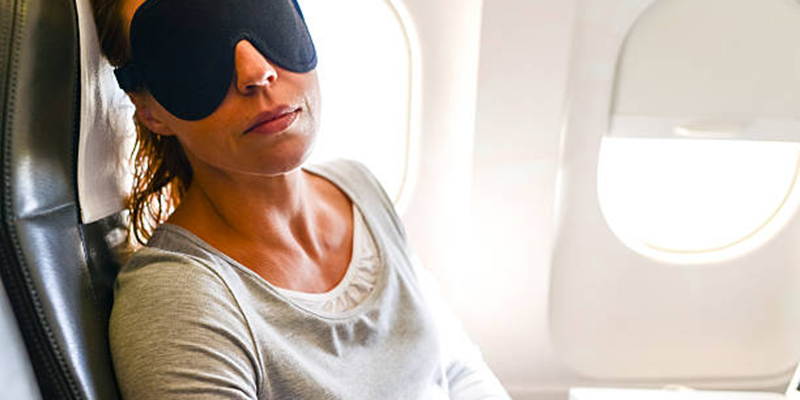How to Get Over Jet Lag While Traveling
Jet lag, caused by crossing multiple time zones that disrupt the body's internal clock, often leads to symptoms like fatigue, difficulty concentrating, mood swings, and sleeplessness, all of which can affect the travel experience. For frequent travellers, understanding jet lag is crucial as it can impact both personal well-being and productivity. However, with effective management, it's possible to reduce its effects and regain balance more quickly. By implementing strategies such as adjusting sleep schedules, staying hydrated, and spending time outdoors, travellers can minimize discomfort and enjoy their journey with greater ease.
Understanding Jet Lag
Our internal clock, known as the circadian rhythm, governs our sleep-wake cycles over a roughly 24-hour timeframe. This rhythm is influenced by outside factors such as light exposure and temperature, which signal our bodies when to feel awake and when to sleep. Travelling across different time zones can lead to a misalignment of this natural rhythm.
When we cross these time zone boundaries, the disorientation can precipitate physical and psychological repercussions. For example, travellers may endure sleep disturbances—manifesting as insomnia or excessive daytime drowsiness—as their systems attempt to adjust to a new routine. Furthermore, changes in mood, including increased anxiety and irritability, can also occur. Imagine a traveller flying from New York to London who finds themselves wide awake at midnight, struggling during afternoon meetings due to drowsiness. This clash of sleep patterns drains energy and can worsen overall mental health, highlighting the importance of effective jet lag management for those who frequently travel.

Causes of Jet Lag
The experience of jet lag can vary significantly from one traveller to another and is influenced by several factors:
1. Number of Time Zones Crossed: The more time zones you traverse, the more likely you are to encounter jet lag. Research finds that traversing five or more time zones dramatically heightens the risk of disrupted sleep.
2. Direction of Travel: Generally, travelling east produces more pronounced jet lag symptoms than flying west. This primarily results from our circadian rhythms aligning with the solar day, making adaptation to an earlier schedule more challenging.
3. Flight Duration: Longer flights often lead to more significant discomfort, contributing to the incidence of jet lag. Travellers can find that the combined fatigue of prolonged travel and disturbed sleep heightens symptoms.
4. Individual Differences: People respond to jet lag differently. Age, overall health, and sleep schedules can affect one's susceptibility to symptoms. For instance, younger individuals may adapt swiftly, while older adults might experience extended effects.
Grasping the nuances of these causes can empower travellers to prepare adequately and adapt more effectively as they navigate time zones.
Symptoms of Jet Lag
Jet lag can leave individuals feeling utterly depleted and disoriented. The most prevalent symptoms encompass extreme tiredness, which complicates staying awake during the daytime, alongside concentration difficulties that can impair both work performance and trip enjoyment. Additionally, mood swings are common; disruptions in the internal clock can lead to increased irritability and emotional instability. Digestive issues such as bloating, constipation, or diarrhoea may also surface as the body battles to adjust to new meal schedules and environments.
The manifestation of these symptoms differs across individuals, with some recovering in merely a day while others may feel the effects for days or weeks. The duration and severity of symptoms generally correlate with travel distance, time zones crossed, and personal sensitivity to routine fluctuations. Recognizing these indicators can aid travellers in preparing for and managing their adjustments more efficiently.
Scientific Strategies to Overcome Jet Lag
1. Gradual Adjustment Before Travel
One effective technique to combat jet lag begins even before boarding the plane. Adjusting your sleep and wake times in the days leading up to your trip can help realign your circadian rhythm with your destination. If your journey is taking you eastward, consider going to bed an hour earlier on successive nights; adjust accordingly for trips to the west. Research highlights the vital role of light exposure in regulating this rhythm: early morning light can assist in resetting your clock earlier. In contrast, evening light can facilitate a shift to a later schedule. This proactive approach equips your body to acclimate more smoothly, diminishing the abruptness that triggers jet lag symptoms.
2. During the Flight
Hydration crucially influences comfort during flights. Low humidity levels in aeroplane cabins can exacerbate feelings of fatigue. Staying well-hydrated and clear of alcohol and Caffeine can counter dehydration and help maintain regular sleep patterns. For better rest during transit, employing a neck pillow for support and wearing an eye mask to block light can enhance sleep quality. Noise-cancelling headphones can also foster a more conducive rest environment, quieting cabin noise and making it easier to drift off.
3. Post-Arrival Recovery
Upon reaching your destination, adjusting promptly to the local time becomes paramount. Maximizing exposure to sunlight throughout the day is one effective strategy, as natural light is essential for resetting your internal clock. Engaging in light physical activity, such as walking, stimulates your body and mind, which can be instrumental in alleviating feelings of fatigue. Aligning your activities with the local time and incorporating outdoor experiences will boost your energy and expedite adjustment to your new surroundings.

Additional Tips and Tricks
To mitigate jet lag, consider adding supplements and mindful dietary practices into your travel routine. Melatonin, a hormone vital in regulating sleep-wake cycles, can be a supportive ally. Taking melatonin supplements about an hour before bedtime at your destination can assist in resetting your internal clock effectively. Moreover, being judicious about your diet—particularly regarding heavy meals and Caffeine consumption close to bedtime—can positively impact the body's circadian rhythms. Focus on consuming light, nutrient-dense meals that promote restful sleep.
Once you're back home, maintaining a consistent sleep schedule remains crucial. Forsake the temptation to oversleep; gradually reconcile your sleeping timings to reflect your home routine. Adopting these small yet significant practices will elevate your sleep quality and ease your transition to new environments. With thoughtful planning, you can minimize jet lag disturbances and savour every moment of your travels!
Embrace the Journey
Effectively managing jet lag is vital for enhancing your travel experiences, allowing you to embrace new destinations without the burden of fatigue fully. By implementing the scientific strategies discussed throughout this article, you can navigate time changes with far more ease and comfort. Remember, jet lag doesn't have to be an unavoidable nuisance but rather a manageable hurdle you can overcome with foresight and strategy. Embrace these actionable steps during your next trip, and transform your travels into rewarding adventures. With the right mindset and approach, you'll minimize jet lag's impact and maximize the joy of each journey ahead!





